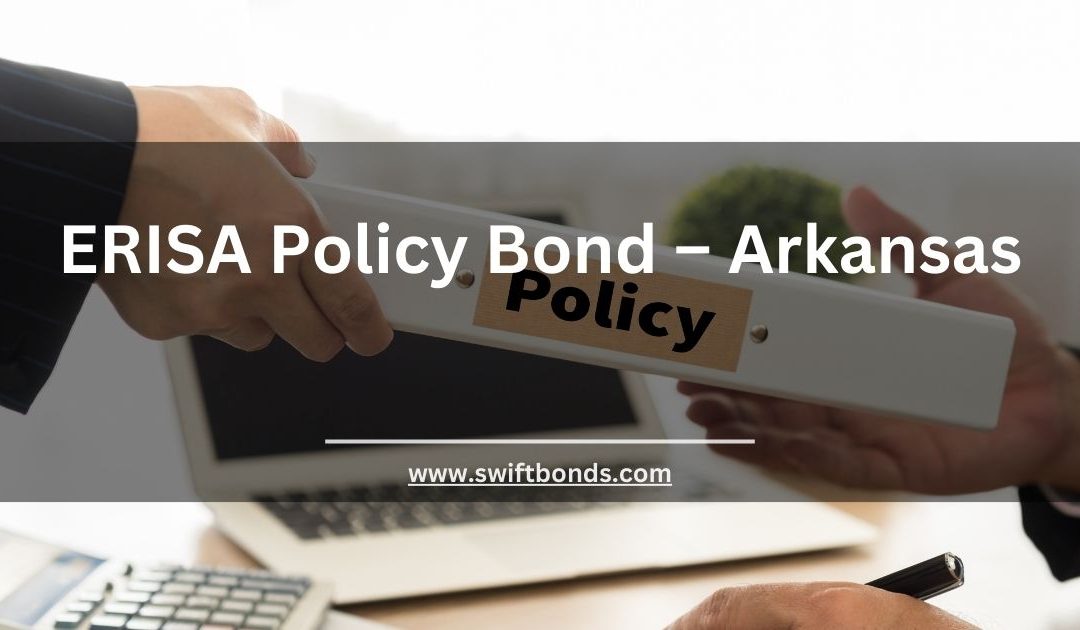Introduction
The Employee Retirement Income Security Act (ERISA) requires specific protections for employee benefit plans, including a Policy Bond to safeguard assets from potential mismanagement or fraud. From our perspective, businesses in Arkansas handling employee benefit plans must comply with these federal regulations, ensuring financial integrity while avoiding legal risks.
The ERISA Policy Bond is designed to provide security for employees by guaranteeing that plan fiduciaries act in their best interests. This bond helps businesses build trust while maintaining compliance with federal requirements.
Misconceptions About ERISA Bonds Can Lead to Compliance Issues
Businesses often misunderstand the role of an ERISA Policy Bond and assume that existing insurance policies provide sufficient protection. That is not the case. ERISA mandates that any individual handling plan funds must be bonded for at least 10% of the plan's assets, with a minimum of $1,000 and a maximum of $500,000 (or $1,000,000 for plans that hold employer securities).
Another common misconception is that this bond protects the fiduciary. In reality, the ERISA Policy Bond protects the plan participants by ensuring that funds are not misused or lost due to fraudulent activities. Without this bond, businesses risk penalties, potential litigation, and non-compliance with federal law.

An Experienced Surety Partner Makes the Bonding Process Simple
Businesses working with a knowledgeable surety provider obtain their ERISA Policy Bond quickly and efficiently. Understanding federal compliance requirements ensures a seamless application process while securing the right bond amount based on plan assets.
Swiftbonds specializes in helping businesses meet their bonding requirements without unnecessary delays or complications. With access to competitive rates and industry expertise, securing an ERISA Policy Bond becomes a hassle-free process, allowing businesses to focus on their operations rather than compliance headaches.

A Step-by-Step Process Ensures ERISA Compliance
Following a structured approach to securing an ERISA Policy Bond helps businesses stay compliant and avoid unnecessary delays. The process includes:
- Determine the Required Bond Amount – Federal regulations require a bond equal to at least 10% of plan assets, with specific minimum and maximum limits.
- Complete the Bond Application – Provide basic company information, including plan details and fiduciary roles.
- Receive a Quote – The surety provider assesses the bond requirement and provides an appropriate premium quote.
- Purchase the Bond – Once the premium is paid, the bond is issued and filed as part of the company’s compliance documentation.
Taking these steps ensures businesses remain compliant while protecting employee benefit plan assets.

ERISA Bonds Protect Businesses and Employees Alike
An ERISA Policy Bond serves as a safeguard for employees and employers, ensuring benefit plan assets are handled responsibly. This bond reassures employees that their retirement funds are secure, while also protecting the business from legal consequences associated with non-compliance.
Employers who secure this bond demonstrate a commitment to ethical financial management and regulatory compliance, enhancing their credibility and reducing risk exposure.

Non-Compliance Can Lead to Costly Penalties and Legal Risks
Failing to obtain an ERISA Policy Bond can result in severe penalties, including fines and legal action. The Department of Labor enforces ERISA requirements, and businesses found without proper bonding may face audits, financial penalties, or litigation from plan participants.
Additionally, in cases of financial mismanagement or fraud, businesses without a bond may be held personally liable for any losses incurred. Avoiding these risks is as simple as securing the appropriate bond amount through a reliable surety provider.
ERISA Bonds Help Arkansas Businesses Maintain Trust and Stability
Businesses that comply with ERISA Policy Bond requirements demonstrate financial responsibility and build trust with employees. Whether managing small-scale benefit plans or large employer-sponsored programs, securing this bond ensures compliance while protecting employees' financial futures.
By working with an experienced bond provider, businesses obtain cost-effective bonding solutions that align with federal requirements. Compliance becomes straightforward, allowing businesses to operate with confidence while safeguarding employee benefits.
Conclusion
The ERISA Policy Bond is a necessary safeguard for businesses managing employee benefit plans. Compliance with federal regulations not only protects employees but also shields companies from legal risks and financial liabilities.
By securing this bond through a trusted surety provider, businesses fulfill legal obligations while demonstrating financial responsibility. With a straightforward application process and affordable premium rates, obtaining an ERISA Policy Bond is a simple step toward long-term compliance and trustworthiness.
Frequently Asked Questions
What does an ERISA Policy Bond cover?
This bond protects employee benefit plans from fraudulent or dishonest acts by individuals who handle plan funds. It does not cover fiduciary breaches or investment decisions—separate fiduciary liability insurance may be needed for those risks.
Who needs an ERISA Policy Bond?
Any business or organization managing an employee benefit plan covered under ERISA must secure this bond. This includes employers offering pension plans, 401(k) plans, and other employee benefit programs.
How is the bond amount determined?
The required bond amount is based on 10% of plan assets, with a minimum of $1,000 and a maximum of $500,000. If the plan holds employer securities, the maximum increases to $1,000,000.
How much does an ERISA Policy Bond cost?
The bond premium depends on the coverage amount and the applicant’s financial standing. In most cases, the premium is a small percentage of the bond amount, making it an affordable compliance solution.
How long does it take to obtain this bond?
The process is typically quick, with approvals often granted within a day or two. Businesses can expedite their application by working with a trusted surety provider.
Can an ERISA Policy Bond be used instead of fiduciary liability insurance?
No, this bond does not replace fiduciary liability insurance. It only covers fraudulent or dishonest acts related to handling plan funds. Employers may need additional coverage for investment-related risks.
What happens if a company does not secure an ERISA Policy Bond?
Failure to obtain this bond can result in fines, Department of Labor audits, and legal action. In cases of mismanagement, the company and fiduciaries may be held personally responsible for financial losses.
How does this bond compare to other compliance-related bonds?
While similar to other financial compliance bonds, the ERISA Policy Bond is specifically designed to meet Department of Labor requirements for employee benefit plans. Other utility-related bonds, such as the Entergy Arkansas, LLC - Utility Deposit Bond and the Arkansas - Medical Marijuana Cultivation Facility ($500,000) Bond, serve different purposes but also ensure compliance with financial obligations.


